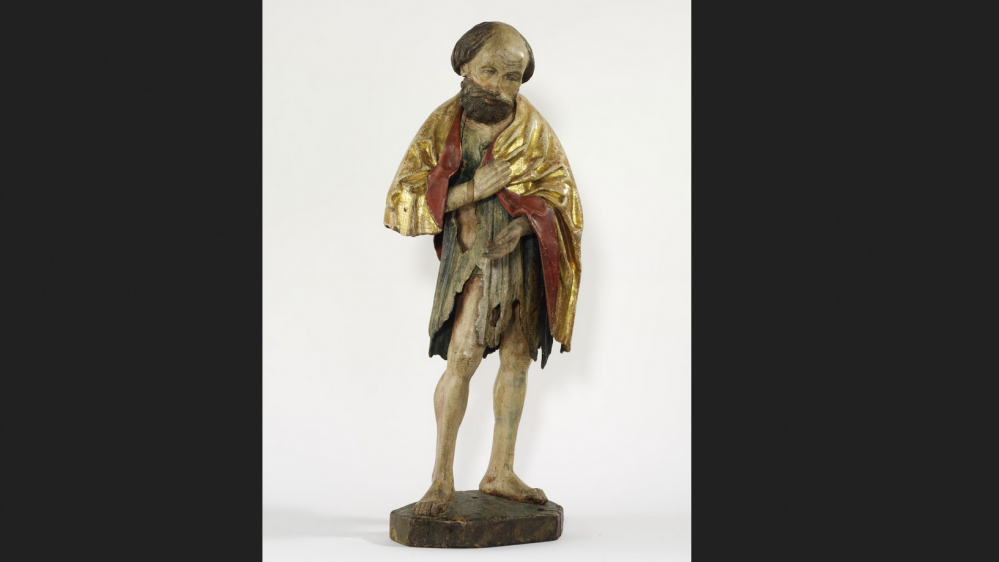The Beggar asking for help
The sculpture in the picture is called The Beggar. It is on view in the amazingly beautiful National Museum of Fine Arts in Budapest (Hungary), and it is part of the museum’s permanent collection. The name of the artist is Leonhard von Brixen, a sculptor, and painter from South Tyrol. He carved this sculpture between 1460-1470 in a realistic and naturalistic style, very original for those days. The Beggar was once considered one of the shepherds in a Nativity scene, but that idea has now been rejected. By the way, the museum is a must for art lovers.
This sculpture was created in an age when poverty was common instead of marginal, as it is nowadays in Western societies and many other countries.
The Beggar can help me
And so do most beggars and homeless people in the street that I pass by nowadays. Although I may think that they need my money or my help or that they should try to find other ways of getting by, I actually felt that it is me who needs the beggar! I need his help. He can teach me how to live more simply, how to stop being addicted to overconsumption, how to be happy and satisfied with nice, good-quality stuff. He can help me to think in terms of how to re-use things rather than throwing away and replacing things easily. He can help me to realize that not every new shirt, pants, pair of shoes, glasses will make me happier. They will not make me look better and will not impress others.
Consumption and extreme individualism took over the West’s key achievements
The Beggar should make the West feel uneasy. Many Western societies are confused today. They wrongly assumed that spreading the idea of the Consumption Society centered on extreme individualism was their key achievement. This was what all the people of the world needed, it would make them happy. But the key achievements of the West are not the Consumption Society and extreme individualism. They are democracy, the nation-state, building relatively homogenous civil societies around Christian-based values, human dignity, and integrity, the establishment of a scientific system that challenged the autocratic and self-serving religious elite of the Middle Ages, free enterprise, and an effective rule of law. These key achievements brought about industrialization, a system of mass production, division of labor, and workers’ rights. Industrialization helped Western societies and those beyond to prosper, to deliver better and healthier lives.
However, somewhere along the way, these key achievements lost their moral compass. Arrogance, naivety, extreme individualism, and consumptionism emerged out of this and took over. The ‘freer’ the individual and the more an individual can consume, enjoy, and be entertained, the better. A society of more, more food, more fashion, more travel, more excitement, more fun, more parties, more cocktails, more streaming, as long as the individual is in charge. This ideology, this outcome of the key Western achievements, has spread around the world, including to poorer nations and regions.
The mess the West created
Overconsumption and extreme individualism resulted in a massive plastic soup in the oceans, enormous e-waste, exhaustion of natural resources, a faster extinction of flora and fauna, a lack of freshwater, and so on. The overarching issue that will implicitly or explicitly dominate international relations and business, if humankind can avoid another world war, is the environment and how to re-establish and re-balance the relationship between human beings and their natural environment. Richer and poorer countries have the same responsibilities – there is no space for a blame game. Richer countries need to be innovative to find ways to change their behavior, to establish alternatives for casino capitalism. There must be sustainable innovations that will move away from overconsumption and extreme individualism.
And The Beggar can help to show the way
Instead of feeling pity for The Beggar, he may feel sorry for the West. He may look at it and think, how can I help you to live more simply? How can I help you to change course? It can be easy. If the West can reflect on its real key achievements and build better societies based on them, then the future can look brighter for richer and for poorer countries. The Beggar can show the West the way.










